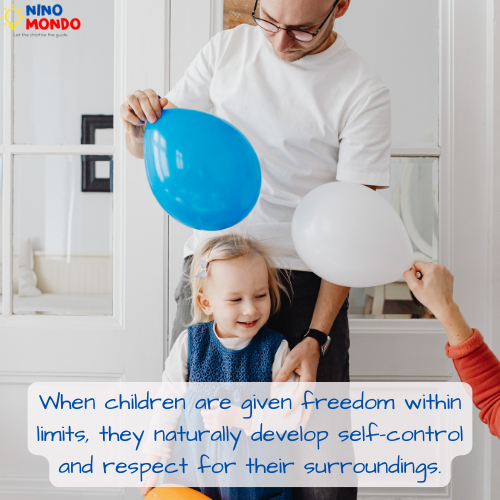How to build Discipline in Kids with Spontaneous Discipline
May 23, 2022
How to build Discipline in Kids with Spontaneous Discipline
If you are constantly reading about how to build discipline in your child, then you have come to the right place. Let’s understand what exactly spontaneous discipline is and how it fits in.
If you have ever found yourself locked in a tug-of-war with your toddler over bedtime, meals, or just putting on shoes, you know what we are talking about. Every parent knows how exhausting those tiny (but mighty!) power struggles can be. We try time-outs, rewards, firm tones—yet somehow, the same battles keep returning.
But that’s where the Montessori approach can step in to offer a calm, respectful, and surprisingly effective way to nurture discipline from within your child.
Discipline provides a child with guiding rules for appropriate action and behaviour at any given moment. Discipline is important in life as it enables one to develop positive action and focus to do their task or job effectively and efficiently. But let’s be honest, when we hear the word discipline, most of us picture something strict, maybe even negative.
This is where the spontaneous discipline changes everything.
In Montessori, discipline isn’t something done to a child—it’s something that comes from within. Rooted in the idea of “respect for the child,” Montessori discipline helps children build an inner sense of order and responsibility.
So, next time, instead of focusing on how to build discipline through instructions, try creating an environment where children naturally choose to be disciplined. Instead of doing something just because an adult is saying so, let them make good choices simply because it feels right to do so.
What is spontaneous discipline?
Dr. Maria Montessori observed that when children are given freedom within limits, they naturally develop self-control and respect for their surroundings. This balance between freedom and structure gives rise to what she called spontaneous discipline—a kind of discipline that blooms from within the child, not something that is forced from the outside.
Traditional discipline often turns into a bit of a power struggle—parents giving commands, children resisting them. But Montessori believes that discipline doesn’t need to be about control or punishment.
The Montessori approach to discipline encourages children to be self-motivated and to proactively decide their own actions and the course of their interactions with others. It shows them that they are trusted enough to make choices, explore freely, and learn from experience, all within a well-prepared and calm environment. And once they begin to enjoy order, they start taking pride in their choices, which helps them show care for the people and things around them.
Moving beyond power struggles
Every parent knows how draining those daily power struggles can be when preparing the process of how to build discipline. You say “no,” they say “why not,” and before you know it, the morning’s gone! But the truth is, these struggles rarely work; they only make it hard and frustrating for everyone.
But with the Montessori approach, the disciplining process can help move beyond power struggles. When we focus on guidance instead of control, children start to cooperate more naturally. Instead of reacting to punishment or reward, they respond to understanding, consistency, and respect.
And over time, discipline becomes less about what we say and more about what they feel is right.

A simple example of how to build discipline with spontaneous discipline
Let’s say your child doesn’t know how to organise their bookshelf. Our first reaction as parents is to jump in and show them the “correct” way. But, instead if we give them a chance to try, then it will help them choose that always. Let them arrange it however they like at first, even if it looks messy. Later, you can gently guide them by asking questions like, “Would it be easier to find your favourite story if we grouped the big books together?”. This way, they will learn to organise and choose to do it because that’s the right way.
Your child will learn not through correction, but through experience. They will begin to notice patterns, enjoy order, and take pride in their little space, which basically is the essence of Montessori discipline—calm, patient, and rooted in self-motivation.
Developing spontaneous discipline with GEMs
To do this, focus on the ‘Genuine Encounter Moments’ (GEMs) where you notice and acknowledge the child’s attempts and achievements.
This spontaneous learning will make your child feel valued and respected. Through the repetition of Montessori discipline, you will be able to build GEMS in your child’s mind that it is only good behaviour gets attention.
Similarly, if you find your children rebuking and being grumpy to others, you can use the if/then statements, another Montessori technique, on how to build discipline.
Example: If you share your food with your friends, then they will adore you.
Something to remember: The Montessori approach emphasises narrating what your child is doing and keeping your tone positive; choosing to say only positive words.
Here are some of the things that you can say (Note: When you say these sentences, intonate as you say those words. A little drama goes a long way ;)):
- “You were REALLY focused when trying to catch the ball.”
- “You held the cup firmly with TWO HANDS.”
- “THAT was an excellent try at stacking.”
- “Thank you for setting the table. It looks beautiful!”
- “The plants look SO HAPPY after you watered them.”
- “The windows look SHINNY after you washed them.”
- “You seem to be getting STRONGER every time you push the ball.”
- “The pattern YOU created while sorting is amazing.”
- “You seem to be DETERMINED to figure this out.”
Note that patience is key here.
This will take time, but with consistency, you will be able to master the art of Montessori discipline.
For instance, when it comes to things like ‘Pack after Play’:
- Show how to do it – gently and slowly
- Show more than once, if necessary
- Do it with them and not for them, and ensure they are involved.
However, don’t be in a rush to hand over responsibility completely. Children can sense when you are trying to scoot off. Yes, they are smarter than us!
Ask them questions like:
- “Do you want to have a go?
- “Do you think you can do it now?
- “Would you like to do this part, and I will do the other?
- “Should we arrange these chairs back so no one gets hurt?
- “Let’s put this away so we have space to do another job?”
Words like these, an important part of the Montessori approach, speak directly to the individuality of the child, giving them control over their choice, and building the capability to make decisions for themselves.
These are small but important details that help build spontaneous discipline and solve your everlasting question of how to build discipline.
Found this helpful? Check out our parenting courses for more such insights on the Montessori approach to parenting.
Don't miss a beat!
New moves, motivation, and classes delivered to your inbox.
We hate SPAM. We will never sell your information, for any reason.

